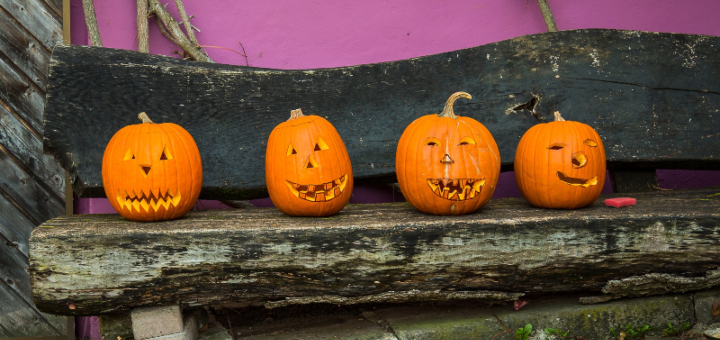
 Image credit: Pixabay (2017), CC0 Public Domain[/caption]
Image credit: Pixabay (2017), CC0 Public Domain[/caption]
Each All Hallows’ Eve, Hallowe’en, or Halloween -- whichever name we prefer -- questions arise as to whether or not it is an acceptable holiday for Catholics to observe. The devil, it is said, is in the details; that is why it is imperative to delve into history. We need facts to determine whether or not participation in the festivities merits our moral approval.
The Origins of Halloween
Upon closer investigation we find that the holiday has been hijacked by secularism. You see, the devil loves to insinuate himself into what is is historically observed by Christians. He then attempts to make it his own, taking souls along the way.
Yet once we realize the true origins of Hallowe'en, we find that this is a day to celebrate, not to frighten. In that vein, we Catholic Christians often choose to dress as saints or other characters we admire, as well as poking a bit of fun at the devil. After all, his battle has already been lost. Jesus Christ the Savior won that victory when He became Man and dwelt among us. He even allowed the devil to tempt Him, as an illustration of the power of His Light over the Darkness.
Historical Days of the Dead
Sometimes the eve of October 31, as well as the days of November 1st and 2nd, are unofficially called the "Days of the Dead." After all, these are the days we remember and pray for those no longer among us on earth. On the evening of October 31 and the day of November 1, we celebrate all of the Saints in Heaven on All Saints' Day. This day is known as All Hallows. Then, on the day after All Hallows, we remember the saved souls who are in Purgatory. There they are purged of the temporal effects of the sins committed during their lifetime, so that they can enter Heaven.
Observe Halloween With Faith
It might be beneficial to consider these three days of Hallowe'en as follows:
- October 31 - Hallowe'en (All Hallows Eve) is a time to recall the reality of hell and work through the best ways to avoid it. We remember that there are damned souls and fervently vow not to join them. Many Catholics attend Mass on the evening of this day, to fulfill their All Saints' Day obligation. This is also the evening that many children dress up and collect sweet treats from neighbors and friends.
- November 1 - All Saints' Day is officially a Holy Day of Obligation. We honor the Church Triumphant on this day by recalling our great saints as well as those uncanonized saints not known to us.
- November 2 - All Souls' Day is not a Holy Day of Obligation. We do, however, remember to pray for the Church Suffering - those souls who are still in Purgatory. Remembering our deceased loved ones and having a Mass said for them is a fitting Corporal Work of Mercy.
The Origins of All Saints' Day
The earliest form of All Saints' Day was celebrated on May 13. As it has been since the 300's, this is still the case in some Eastern Churches. Initially, only the martyrs were commemorated, but by 741, all of the saints were included. It wasn't until the year 844 that Pope Gregory III transferred the Feast Day to November 1. This was the year he consecrated a chapel in St. Peter's Basilica to All Saints. This fact dispels the theory that the date of All Saints' Day was fixed because of the harvest festival of the Irish pagans. All Souls' Day originated with the Bishop of Cluny, who in 1048 decreed that the Benedictines of Cluny pray for the souls in Purgatory on this day. The practice further spread until it was recommended for the entire Latin Church by Pope Sylvester II.Practices Developed Over Time
In Irish popular piety, the evening before, Hallowe'en (All Hallows or "Hallows' Eve") became a day of remembering the dead who are damned. Customs surrounding this theme spread to many parts of the world. This initiated the focus of Hallowe'en as the reality of Hell. As a result, scary characters, evil and how to avoid it, and the sad fate of damned souls captured the imagination.Halloween Has Catholic Roots
Some traditional circles find Halloween, and whether or not to celebrate it, to be controversial. We sometimes hear that Hallowe'en is a pagan holiday. That claim is quite contrary to the meaning and true origin of Hallowe'en. All Hallows' Eve is a Catholic a holiday with roots in remembering saints, sinners, and the damned. Although some say that the holiday actually stems from Samhain, a pagan Celtic celebration, or is Satanic, this simply is not accurate.The Secularization of Halloween
As with many Church celebrations, commercialization/secularization of the holiday and popular myths proclaiming the origin as pagan, find some refusing to celebrate Hallowe'en at all. Others celebrate without trepidation while keeping their celebration Catholic and refraining from the ugliness that has marred the day in the secular world. Whatever your family decides, it is vital to keep the facts straight and to refrain from judging others who decide to celebrate Hallowe'en differently or not at all. As in all instances of our lives, charity is key.How to Observe Halloween
If your family decides to celebrate Hallowe'en, here is a bit of trivia and some suggestions:- The customs of Hallowe'en are a combination of Catholic popular devotions and French, Irish, and English customs all mixed together.
- The custom of dressing up comes from the French.
- Carved Jack-o-lanterns come from the Irish, who originally carved turnips.
- English Catholics initiated the custom of begging from door to door, which was a purer form of "trick-or-treating." Children would go door to door begging their neighbors for a "Soul Cake." In turn, they would say a prayer for those neighbors' dead saying, "A Soul Cake, a Soul Cake, have mercy on all Christian souls for a soul cake!"
- Traditional foods for Hallowe'en include cider, nuts, popcorn, and apples -- and are best eaten around a fire.
- Bobbing for apples on Hallowe'en is an old Celtic custom.
- Dressing up as a saint can be a springboard for learning about their lives and special graces. The practice of wearing saint costumes offers the opportunity to teach others about those who loved God so much.
- Incorporating the wearing of costumes into a visit to a nursing home brings a bit of joy to the elderly and lonely.
An Eye Toward Faith
Copyright 2018 Birgit Jones
About the Author

Birgit Jones
Birgit finds herself immersed in writing on her blog, Catholic Life In Our Times, where she reflects on current events with a Catholic, pro-life perspective. She also serves as Graphic Editor and Contributing Columnist at Catholic Stand as well as writing for other online Catholic publications.


.png?width=1806&height=731&name=CatholicMom_hcfm_logo1_pos_871c_2728c%20(002).png)
Comments